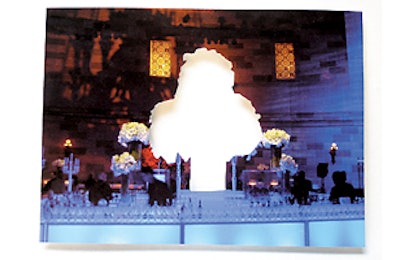
For a New York fashion show in 2005, Lara Baldwin, executive vice president of business development at Landmark Event Services, was approached by another decor and production firm to design and build set pieces. Baldwin and her team spent hours laboring over one-of-a-kind designs to camouflage columns in the event venue and to create an intimate V.I.P. area, with movable walls and upholstered bench seating, in the otherwise cavernous space. But after four site visits and 11 proposal drafts, all executed with only a verbal agreement in place, things turned sour. “All of a sudden the [other company] just dropped off the face of the earth,” Baldwin says. She tried to get in touch with the company by phone and email, and then sent a letter reminding them that all designs were copyrighted. It didn’t help.
“We went to the event and saw that all of our ideas were stolen. We designed all that and somebody else got the credit,” Baldwin says. “It felt really crappy.” Oh, and that letter she sent? Returned unopened. “They know what they did, and they did it in a very deceitful way.”In a discipline as collaborative as event production, such tales of disputes over creative content are all too common. The event world is rife with stories of ideas, designs, and even entire proposals taken lock, stock, and barrel and re-created with no credit—or compensation—given to the creator.
The negative effects of such practices don’t only hit the vendors who feel ripped off. Clients who use ideas from suppliers without paying for them—or who allow their vendors to rip off subcontractors, knowingly or not—can get a reputation in the industry that prevents top suppliers from working with them. Even innocent in-house event specialists might not realize that fallout from idea-poaching lands on them, too. It can make bidding more complicated and make finding the right expert for a job tougher.
Many producers say the practice of poaching ideas is disturbingly prevalent. “You do a proposal or a design, come up with the concepts, and they come back and say, ‘We’re not going to do that’— then do the exact thing,” says Terry Singleton, president of CCP Events Inc. in Atlanta.
Singleton won’t name the guilty party, but she says a major local transportation entity pulled this on her once. She was asked to submit a proposal for an event featuring table games from different regions of the world. “We went out and spent hours researching table games tied to a geographic region of the world. There were even games that came from Africa,” Singleton says. The organization took the proposal without hiring her, and subsequently used every one of her suggestions for their event. “There was no way they could have come up with these ideas on their own.”
Sometimes the light-fingered party isn’t the event host but a subcontractor. Chris Gasbarro, director of business development at Braintree, Massachusetts-based Party by Design, recalls an elaborate set he created for a party celebrating the opening of a Northeast resort. The centerpiece was to be a custom-made design that would tie together the visual and thematic elements of the set. He subcontracted construction of the piece to a third party, which executed the concept and then turned around and started marketing the piece as its own design.
“They’re not a vendor [of ours] anymore; that’s one of our recourses,” Gasbarro says. “We don’t work with a company that takes advantage of that.” He now has a subcontractor agreement that spells out who owns completed designs.
When a sizable direct-sales group came to San Diego a year ago, it solicited proposals from several local event specialists. “It was the kind of business everybody wants, because it’s high profile,” says Fabienne Hanks, vice president of sales and marketing at the Meeting Manager, a destination-management company. Along with other San Diego event producers, she sent in multiple proposals, only to be informed in a terse email that the group had decided it didn’t have the budget to use any specialists and would be handling everything in-house. Of course, it still had the budget to reproduce the elaborate suggestions of Hanks and her peers, including a bash on the Midway aircraft carrier. “When the event actually happened, we have enough spies that we saw the events we had proposed. It mirrored what we had designed.”
Sometimes ideas get passed on to another vendor with a better price. “We have had people ask for our proposal, and then turn around and use our ideas and go to another entertainment company,” says Pam Burton, president of Cast of Thousands Entertainment Company Inc. in McLean, Virginia, near Washington, D.C.
She even caught a client in the act: For a Zen-themed party to celebrate a D.C. restaurant’s anniversary last year, Burton submitted a proposal that included a diverse cast of characters, from an origami artist to a tea-leaf reader to what Burton considers her pièce de résistance, a body-painted Indian goddess living statue.
“Then they turned around to another entertainment company and gave them our entire proposal and asked for a price,” Burton says. “So then this other entertainment company called us, and we [said], ‘Wait, who’s this for?’” Burton confronted the restaurant’s general manager and eventually got the booking.
But most of these stories don’t end that way, so when vendors and producers spend time and resources to come up with ideas that get stolen, they look for ways to protect themselves. Some producers fight back by copyrighting their work or inserting legal jargon into a proposal, but industry lawyers say proving ownership of an idea is an uphill struggle. “One of the issues is that some planners have inflated ideas about how unique their ideas really are,” says Jim Goldberg, an attorney with Goldberg & Associates in Washington, D.C.
The downside is that many of these safeguards create more paperwork and take more time for the people who hire these producers after they’ve been burned. Some producers have taken to requesting deposits or a portion of the fee up front. Those headaches can complicate the selection process—and take those vendors out of the running. “No one can afford to take money out of their budgets for proposals we’re not going to use,” says Kate Demarest Lastinger, a vice president of event marketing at SunTrust Bank in Atlanta. She also points out that corporate planners have a tough balancing act of their own to manage. “When you get a proposal, a lot of times vendors will come at you with the very same ideas. It’s very tricky.”
Many independent event producers are so suspicious of requests for proposals—even though that’s the simplest way for corporations to find specialists—that they turn down the chance to bid. “We don’t get involved in big bid processes because it’s just an idea search, and between 50 and 60 percent of the time, the incumbent gets it anyway,” says Tim Brown, president of Meeting Sites Resource in Irvine, California.
“When I see a list with 10 people copied on it, I’m not going to bid on it even if I could be the best person for it,” says Brian Acheson of VIP Events in Dallas. “[The clients are] not doing themselves a service.”
Kay Burke, a meeting manager for J.C.Penney in Plano, Texas, says she’s had event producers turn down the chance to bid on projects, but she defends the bid process as a necessary way for corporate meetings departments to do business. “We just completed a proposal for a $1.5 million event piece,” she says, and for such sizable expenses, “we expect to be able to shop and purchase the right product for our events.”
Burke also points out that some thievery claims are exaggerated. “It’s not black-and-white,” she says, “but bottom line, there are only so many ideas out there.” Especially in popular meetings destinations such as Orlando, she says, many local independents often churn out proposals that bear a lot of similarities to one another. “I’m sure someone is going to feel they were not treated fairly because maybe some portion of their proposal was the same,” she says. “The only thing I can say is, it’s just part of the business.”
“We went to the event and saw that all of our ideas were stolen. We designed all that and somebody else got the credit,” Baldwin says. “It felt really crappy.” Oh, and that letter she sent? Returned unopened. “They know what they did, and they did it in a very deceitful way.”In a discipline as collaborative as event production, such tales of disputes over creative content are all too common. The event world is rife with stories of ideas, designs, and even entire proposals taken lock, stock, and barrel and re-created with no credit—or compensation—given to the creator.
The negative effects of such practices don’t only hit the vendors who feel ripped off. Clients who use ideas from suppliers without paying for them—or who allow their vendors to rip off subcontractors, knowingly or not—can get a reputation in the industry that prevents top suppliers from working with them. Even innocent in-house event specialists might not realize that fallout from idea-poaching lands on them, too. It can make bidding more complicated and make finding the right expert for a job tougher.
Many producers say the practice of poaching ideas is disturbingly prevalent. “You do a proposal or a design, come up with the concepts, and they come back and say, ‘We’re not going to do that’— then do the exact thing,” says Terry Singleton, president of CCP Events Inc. in Atlanta.
Singleton won’t name the guilty party, but she says a major local transportation entity pulled this on her once. She was asked to submit a proposal for an event featuring table games from different regions of the world. “We went out and spent hours researching table games tied to a geographic region of the world. There were even games that came from Africa,” Singleton says. The organization took the proposal without hiring her, and subsequently used every one of her suggestions for their event. “There was no way they could have come up with these ideas on their own.”
Sometimes the light-fingered party isn’t the event host but a subcontractor. Chris Gasbarro, director of business development at Braintree, Massachusetts-based Party by Design, recalls an elaborate set he created for a party celebrating the opening of a Northeast resort. The centerpiece was to be a custom-made design that would tie together the visual and thematic elements of the set. He subcontracted construction of the piece to a third party, which executed the concept and then turned around and started marketing the piece as its own design.
“They’re not a vendor [of ours] anymore; that’s one of our recourses,” Gasbarro says. “We don’t work with a company that takes advantage of that.” He now has a subcontractor agreement that spells out who owns completed designs.
When a sizable direct-sales group came to San Diego a year ago, it solicited proposals from several local event specialists. “It was the kind of business everybody wants, because it’s high profile,” says Fabienne Hanks, vice president of sales and marketing at the Meeting Manager, a destination-management company. Along with other San Diego event producers, she sent in multiple proposals, only to be informed in a terse email that the group had decided it didn’t have the budget to use any specialists and would be handling everything in-house. Of course, it still had the budget to reproduce the elaborate suggestions of Hanks and her peers, including a bash on the Midway aircraft carrier. “When the event actually happened, we have enough spies that we saw the events we had proposed. It mirrored what we had designed.”
Sometimes ideas get passed on to another vendor with a better price. “We have had people ask for our proposal, and then turn around and use our ideas and go to another entertainment company,” says Pam Burton, president of Cast of Thousands Entertainment Company Inc. in McLean, Virginia, near Washington, D.C.
She even caught a client in the act: For a Zen-themed party to celebrate a D.C. restaurant’s anniversary last year, Burton submitted a proposal that included a diverse cast of characters, from an origami artist to a tea-leaf reader to what Burton considers her pièce de résistance, a body-painted Indian goddess living statue.
“Then they turned around to another entertainment company and gave them our entire proposal and asked for a price,” Burton says. “So then this other entertainment company called us, and we [said], ‘Wait, who’s this for?’” Burton confronted the restaurant’s general manager and eventually got the booking.
But most of these stories don’t end that way, so when vendors and producers spend time and resources to come up with ideas that get stolen, they look for ways to protect themselves. Some producers fight back by copyrighting their work or inserting legal jargon into a proposal, but industry lawyers say proving ownership of an idea is an uphill struggle. “One of the issues is that some planners have inflated ideas about how unique their ideas really are,” says Jim Goldberg, an attorney with Goldberg & Associates in Washington, D.C.
The downside is that many of these safeguards create more paperwork and take more time for the people who hire these producers after they’ve been burned. Some producers have taken to requesting deposits or a portion of the fee up front. Those headaches can complicate the selection process—and take those vendors out of the running. “No one can afford to take money out of their budgets for proposals we’re not going to use,” says Kate Demarest Lastinger, a vice president of event marketing at SunTrust Bank in Atlanta. She also points out that corporate planners have a tough balancing act of their own to manage. “When you get a proposal, a lot of times vendors will come at you with the very same ideas. It’s very tricky.”
Many independent event producers are so suspicious of requests for proposals—even though that’s the simplest way for corporations to find specialists—that they turn down the chance to bid. “We don’t get involved in big bid processes because it’s just an idea search, and between 50 and 60 percent of the time, the incumbent gets it anyway,” says Tim Brown, president of Meeting Sites Resource in Irvine, California.
“When I see a list with 10 people copied on it, I’m not going to bid on it even if I could be the best person for it,” says Brian Acheson of VIP Events in Dallas. “[The clients are] not doing themselves a service.”
Kay Burke, a meeting manager for J.C.Penney in Plano, Texas, says she’s had event producers turn down the chance to bid on projects, but she defends the bid process as a necessary way for corporate meetings departments to do business. “We just completed a proposal for a $1.5 million event piece,” she says, and for such sizable expenses, “we expect to be able to shop and purchase the right product for our events.”
Burke also points out that some thievery claims are exaggerated. “It’s not black-and-white,” she says, “but bottom line, there are only so many ideas out there.” Especially in popular meetings destinations such as Orlando, she says, many local independents often churn out proposals that bear a lot of similarities to one another. “I’m sure someone is going to feel they were not treated fairly because maybe some portion of their proposal was the same,” she says. “The only thing I can say is, it’s just part of the business.”



















